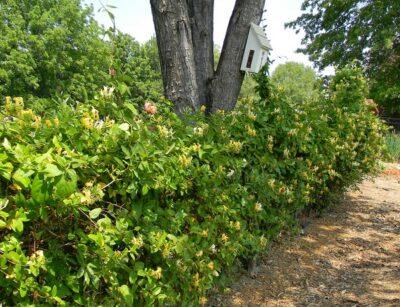Fencing your entire property line can be an expensive endeavor. You may be able to complete only a section at a time, or you might choose to wait for several years to be able to afford the fencing that you want and need. In addition, you may have certain areas on your property line that are difficult to fence.
Have you considered a living fence? A living fence makes a great property line barrier and can serve different purposes. You can plant inexpensive fencing that will deter anyone or anything from getting through.
There are several different ways that living fences can protect you, your family and your property:
Privacy. Planting a living fence can give you privacy from neighbors, people going down the road and people who might want to see what is on your property. A lush living fence will keep you private all year long.
Security. The right kind of fencing will leave you with ample protection. No one will want to cross a fence made of honey locust, for example. There are also several other living plants that can cause great bodily harm if crossed. These will have large thorns and will help deter anyone from crossing into your property.
Get Delicious, Nutrient-Dense Heirloom Seeds Here!
Shade. A good living fence can offer your yard and garden plants shade during the hot summer months.
Wind break. A living fence creates a windbreak that protects small trees and vegetables that might be damaged in storms.
Longevity. Regular fencing is susceptible to damage and failure over time. Repairs and replacements can get costly. As long as you properly care for the plants, a living fence can last longer than any other fence that you might install.
Story continues below the video
How to Choose Your Living Fence
When choosing plants for your living fence you will want to ensure that you have adequate planting space on your property line. Here are some different types of plants that make a great protective and living fence:
- Honey locust
- Leyland cypress
- Organ pipe cactus
- Hawthorn
- Black locust
- Blackthorn
- Rose bush
Do your research to determine the correct spacing of the plants and any maintenance they will need. Many of the varieties listed above need regular pruning. If you have goats, you can have them help with the pruning, but make sure the plants are not harmful to your animals.
If you want a secure fence around your property, consider planting a living fence for both privacy and protection. If you have a large property, a living fence is the most economical and sound fence option. Not only will you have a great fence that will last a long time, but you will also be making your yard look great.
What type of living fence have you planted? Share your tips or questions in the section below:
Do You Know The Biggest Mistake Gardeners Will Make This Year? Read More Here.
 Off The Grid News Better Ideas For Off The Grid Living
Off The Grid News Better Ideas For Off The Grid Living





